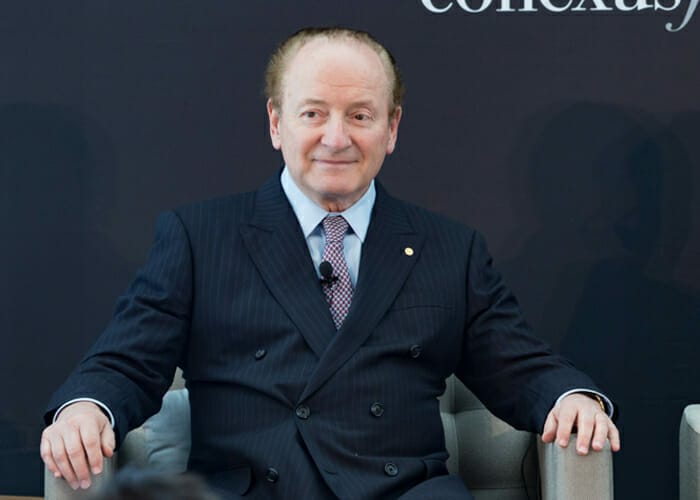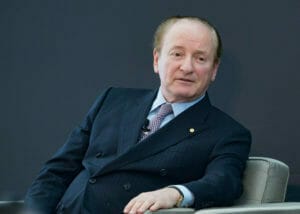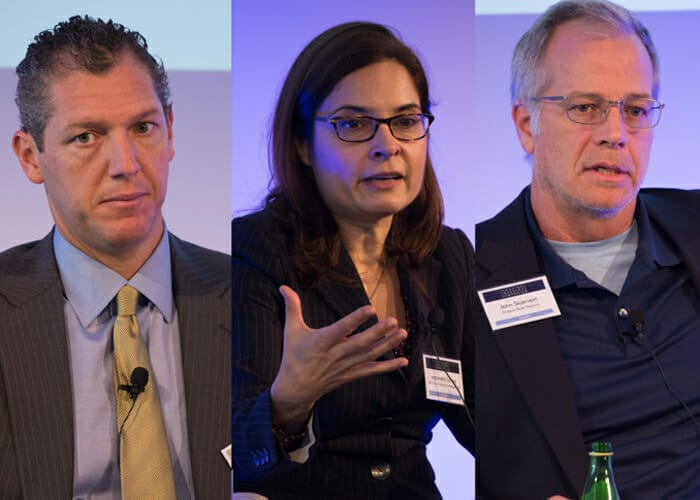At the Fiduciary Investors Symposium at the Massachusetts Institute of Technology in October 2017, top1000funds.com interviewed Nobel laureate Robert Merton, Distinguished Professor of Finance at MIT Sloan School of Management.
Merton generously shared his personal journey and lessons he learned from working at MIT and Harvard University over the last 50 years, retirement solutions, his prediction for how fintech will influence advice, and the future of active management (listen to the podcast).
Merton, who is also professor emeritus at Harvard, says there is nothing to fear from the growth in passive investing.
“I don’t have a problem at all with passive investing, all it does is leverage those that are active,” he says. “But I do think active management…could do huge amounts for their clients by helping them dynamically manage things, and set goals…which does not require the pursuit of a higher Sharpe ratio, which is the focus at the moment.
“I think active needs to become more broad, more integrated, more a service, a true professional service, rather than [being] a one-trick pony,” he says.
While not a fan of the name ‘smart beta’, Merton says breaking down alpha into its sources is useful.
“Where did the alpha come from and why do you care?” he asks, noting investors should care because it affects other areas of investing.
“Understanding the source of alpha will allow you to improve all the things you do, like manager selection, deciding allocations among managers, and [determining] who should be evaluating managers in the first place.”
Financial services alpha
Merton says there are three types of alpha: traditional alpha, financial services alpha, and dimensions of risk or dimensional alpha.
“Hedge fund, systematic returns, come from financial services alpha, not from being faster or smarter,” he explains. “They earn it by providing services like intermediation. I was one of the co-founders of Long-Term Capital Management and we told investors then that our systematic ways of making money meant we were an intermediation business; that our counterparties, like [sovereign wealth funds] or endowments, were not dumber or slower, but they have institutional rigidities, like capital requirements, which caused them to care about how they take positions. But if you’re a hedge fund, you don’t care about any of those things, so that makes you a great counterpart as an intermediary and, therefore, able to take the other side of that trade at a lower price than another bank.”
Merton received the Nobel Prize in Economic Sciences in 1997 for a new method of determining the value of derivatives, and has been recognised for translating finance science into practice. He has observed many innovations over the years, and believes fintech will improve finance in many areas, particularly in processing, [which will add] transparency; however, he says in some important parts of finance, including advice, it will face many headwinds.
“How long would I have to observe or monitor my portfolio, that’s managed by you, for me to have statistical significance before I can determine you are a good manager? If you run a T statistic on this, it’s somewhere between 30 and 400 years,” he says. “The point being, financial advice is not verifiable. It can’t be verified – not in a week, not in a month, not in five years.
“Fintech will do a lot of good things, and help us, but it won’t do many of the things people are talking about, or it’s not going to do them well.”
Taking on retirement with finance principles
In addition to his many other achievements, in 2017, Merton was named the S. Donald Sussman Fellow, which honours individuals or groups who best exemplify S. Donald Sussman’s career success in quantitative investment strategies and models. As part of the honour, the fellow is to give three lectures at MIT. In giving these lectures, Merton focuses on retirement solutions.
“The retirement problem is a global problem,” he says. “The good news is, finance science can be used to solve it. Design things on finance principles, rather than institutionally where you say you’re designing a retirement system for Germany or Holland or the US. Look at the problem and solve it the best way you know how without constraints – regulatory, tax or behavioural – because all those are changeable. If you design it on finance principles, just like physics, they apply everywhere in the world. If you do that, your production costs and risk management are wholly different than if you design them institutionally and have 21 risk-management departments in 21 countries.
“Most people in this room spend all of their time trying to get returns. You can’t dial up return for the same risks so that’s not a feasible answer, [neither is] getting costs down,” he told delegates, urging them to focus instead on how to increase retirement benefits without increasing assets.
“You won’t get there by getting more assets; instead, you need to use those assets smarter.”
Merton believes goals-based investing is going to be important.
“If you tell me your goal, I can always improve your performance without improving the Sharpe ratio over the generic strategies that are usually done,” he argues. “If you tailor [the advice], it will fit better. That is something that has a lot of runway in front of it. [That] doesn’t mean it’s easy to do, but it will be a trend,” he says, reminding delegates that “3 per cent plus CPI is not a goal”.
Merton believes reverse mortgages could be the ideal solution to the retirement problem.
“It’s a terrible name and it’s poorly designed but, in fact, they are the ideal solution,” he says. “If we do it, we’ll be able to match what they can do from their pension in an annuity. That’s big, if it’s designed properly, and that’s what we need to do if we’re going to solve the retirement problem. The asset-management industry should be all over this.”
The full conversation is available in this podcast.











